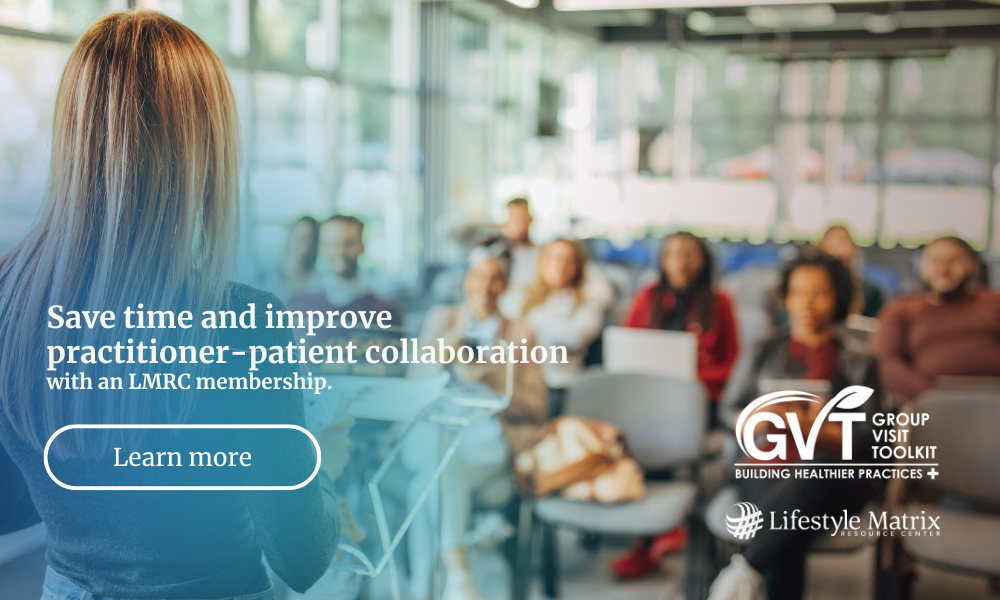Whether you're just starting out or already running your own practice as an integrative medicine clinician, building strong foundations for both your practice and your patients is key. Establishing a system for delivering clear, empowering patient communication can save you valuable time and energy, eliminating the need to constantly create patient education materials from scratch.
In this blog post, we'll explore how to build these foundations and help your patients reach their health goals by utilizing ready-made resources.
Implementing Lifestyle Interventions and Personalized Nutrition
Lifestyle medicine and nutrition are at the heart of any successful integrative practice. Start where your patients are, encouraging "progress over perfection" as they make lifestyle changes. Personalized nutrition recommendations that consider the patient's unique health status, goals, and preferences are key to achieving long-term success.
LMRC’s Patient Handbooks can serve as a practical tool for guiding patients through these changes. Treat them as workbooks that patients can refer to during and between visits, which reinforces their understanding and commitment to their health plan.
Empowerment Tip: Encourage patients to take small steps and celebrate their wins. Empower them by reinforcing that even incremental progress is valuable. This mindset can improve their confidence and motivation to stay on track.
Engaging Patients Through Communication and Empathy
The way you deliver information matters just as much as the information itself. The key to successful patient engagement is presenting information in a way that patients can understand and relate to. Empathy plays a huge role here—understanding your patient’s “why” helps anchor treatment plans to their personal goals and makes the process more meaningful.
Regular touchpoints, especially in the early stages of treatment, are crucial for keeping patients on course. Follow-up appointments, phone calls, or even email check-ins can make all the difference in ensuring that your patients stay engaged with their care plan.
The Power of Group Visits and Patient Support
If you haven't yet incorporated group visits into your practice, it may be time to consider their potential benefits. Group visits provide a platform for patients to support and learn from each other, fostering a sense of community that can enhance their health outcomes.
Patients often feel more motivated and empowered when they see others making progress alongside them. By building a supportive community within your practice, you can create an environment where patients feel connected and engaged in their healing journey.
Celebrate Small Wins and Keep Patients Engaged
Patients need to feel progress, no matter how small. Celebrate their achievements, whether it's adhering to dietary changes, increasing physical activity, or simply attending follow-up visits. These "small wins" help build momentum and keep patients motivated to continue their health journey.
Follow-Up Tip: For complex patients, frequent touchpoints and consistent follow-ups are essential in keeping them engaged and ensuring they stay on track. Make follow-up plans a priority, especially in the first few weeks of treatment.
Utilizing Clinical Protocol Guides and Patient Education Resources
A well-structured practice relies on the proper use of resources to engage and educate patients. LMRC’s clinical protocol guidebooks (In-Practice Guides) and patient education materials, like topical Patient Education Pads are critical tools that can streamline your workflow and enhance patient understanding. These materials act as both a roadmap for your clinical decision-making and a communication tool to make complex health information more accessible to your patients.
By using clinical textbooks, in-practice guides, patient handbooks, and Patient Education Pads, you can ensure your patients stay informed and engaged. These tools not only clarify treatment plans but also reinforce the steps patients need to take to improve their health.
Pro Tip: Keep clinical reference guides (a series called The Standard Road Maps) written by Tom Guilliams, PhD on-hand to stay updated with the latest research and best practices in functional and lifestyle medicine. This will not only enhance your credibility but will also ensure you're offering the most effective treatments to your patients. You can also download the latest Standard Monograph from Dr. Guilliams for free. The monograph series is written for clinicians, but many find they are useful to share with patients who are interested in diving into understanding their health concerns in greater detail.
The Bottom Line
Ultimately, building a successful integrative medicine practice is about creating strong, trusting relationships with your patients. Empathy, education, and regular communication form the backbone of this relationship. By implementing the clinical resources available through LMRC, utilizing in-practice guides, and focusing on personalized care, you can offer patients the tools they need to succeed while also setting your practice up for long-term growth.
Remember—for yourself and for your patients—to start where you are, because where you are is enough.
-portera-d-c-ifmcp.png?sfvrsn=4047735c_1)
Lisa Portera, D.C, IFMCP is an Integrative Doctor of Chiropractic, Certified Functional Medicine Practitioner (IFMCP) and Sr. Faculty for the institute for Functional Medicine.
With over 30 years of experience in clinical practice and 20+ years of educating physicians of all disciplines in the principles and practices of functional medicine, she has worked extensively to improve clinical implementation in the US and abroad. She is a member of the IFM team that mentors military physicians through the Department of Defense on the application of functional medicine for chronic inflammatory and chronic pain conditions.
For the past 10 years, Dr. Portera has served as Adjunct Faculty at Bastyr University, where she teaches fourth year naturopathic students the clinical application of functional medicine principles to address complex chronic inflammatory and autoimmune disease.
She is on the advisory board for GrowBabyHealth, which is dedicated to improving prenatal health, reducing the risk of pre-term birth, and reducing chronic inflammatory disease in children.
Dr. Portera joined the LMRC team as the Director of Program Education in September 2022.





